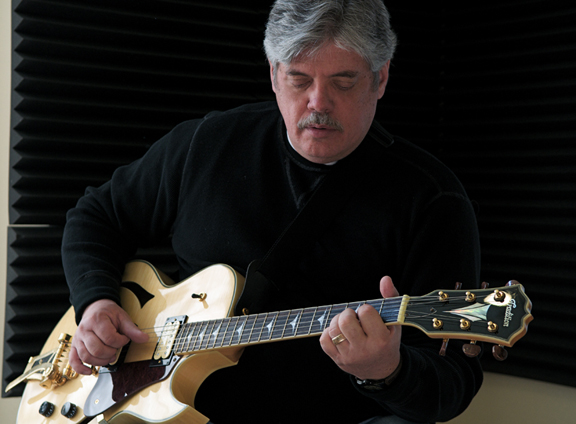To ring in the release of the Dixie Chicks’ second record, Fly, each of the Star-Telegram’s three music critics were asked to come up with a story idea. Dave Ferman, the paper’s pop music critic, chose to interview one of the Chicks. Country music critic Shirley Jinkins did a where-are-they-now piece on the pre-Natalie Maines members of the Chicks. And I profiled Lloyd Maines, Natalie’s dad and producer and pedal steel extraordinaire. A lot of the records Lloyd produced or played on had made an indelible mark in country and alternative-country circles, making guys like Joe Ely and Jeff Tweedy leap at the chance to rave about him. From the Star-Telegram, 1999.


Text:
DALLAS – On a recent weekend night at Sons of Hermann Hall, one of the most important figures in Texas music was on stage. But as usual, Lloyd Maines was in the shadows.
Playing pedal steel in Ray Wylie Hubbard’s band, Maines epitomized the unsung hero: There he was, a man whose steel playing helped define a sound and style in and out of the city limits of his Lubbock hometown, a man whose production credits grace the liner notes of nearly 100 discs, a man whose daughter fronts one of the nation’s most popular groups – there he was, just sitting off to Hubbard’s side, perfectly content with the spotlight shining on someone else.
“I’ve never wanted to be a star,” says Maines, 48, a few days later at his home in Austin, where he has lived for the past few years. “I want to be respected by fans and peers, but seeing my name in lights, I could not care less.”
It’s that unselfish attitude, along with his musical versatility and patient, hands-off approach to producing, say longtime friends and collaborators, that makes him one of the most sought-after producers in the music industry – and one of the best.
“I’ve worked with Lloyd many, many years, and that’s one of the great things about him, he’s not about taking a lot of credit or getting a lot of attention,” says acclaimed Texas singer/songwriter Joe Ely, whose history with Maines spans more than two decades. “He lets you do your thing. He helps artists realize their own sound without influencing it.”
Terri Hendrix, a San Marcos-based singer who has worked with Maines since 1997 and will go on a European tour with him and Hubbard in two weeks, says it’s Maines’ chameleonlike flexibility that has made her one of many of his repeat customers.
“Lloyd can produce anything. He’s not just a country producer,” she says. “I do all styles of music, and he just goes right along with me. He’s a jack-of-all-trades. That’s what brings him to the table.”
As a producer and pedal steel player – and let’s not forget he’s also the father of Dixie Chicks lead singer Natalie Maines – Lloyd Maines has been involved with some of this era’s best records, from vital efforts by Texas musicians like Ely, Terry Allen, Robert Earl Keen and Butch Hancock to discs from national scene-makers like Jerry Jeff Walker and Uncle Tupelo.
“He’s one of the most amazing musicians I’ve ever met in my life,” says Jeff Tweedy, the 32-year-old front man of rock outfit Wilco and veteran of Uncle Tupelo, early practitioners of the roots-rock genre. Maines played steel on Uncle Tupelo’s influential 1993 Anodyne disc and Wilco’s 1995 debut, A.M. “We needed a steel player when we were making Anodyne, and someone recommended him,” Tweedy says from a tour stop in Cleveland. “The great thing about him was that he was so patient with us. Being the hacks that we are, it would take us 30 takes to get a song right.
He’d get his part right on the first take. He made those songs so special, too. Some of them we don’t even play live because they seem so empty without him.”
With an upbringing greatly steeped in country music (courtesy of the Maines Brothers, a Lubbock outfit featuring Maines’ father and two uncles)and his parents’ love for Buck Owens and other country veterans), Maines learned to play a variety of instruments, starting while he was in his teens. His favorite: pedal steel guitar.
“Growing up in Lubbock, you do one of two things: play sports or play music. I did both,” Maines says. “There was an old steel player in my dad’s band. I was always infatuated with watching him play, and once when I was at football practice, he set up a pedal steel for me. I came home that night and started playing it.
“You can apply some of what you know on regular guitar to pedal steel guitar, but I had to pretty much figure it out on my own,” he says. “Back then in the mid- to late-’60s there were no teachers or instructional tapes. Willie Nelson used to come to town, and I would study the techniques of his steel player, Jimmy Day. And Waylon Jennings had a terrific player, Ralph Mooney. That’s how I learned to play. It was a pain . . . to carry around, but it’s the only instrument that you can make cry or scream. It’s just a real emotional instrument.”
Getting started
By the time Maines was in his 20s, he and his three brothers – Kenny, Steve and Donnie – were playing as the Maines Brothers, after their father, James, retired the original lineup. Off and on for the next two decades, this lineup of the Maines Brothers would tour and release two discs for Mercury/Polygram; Maines says that because of everything else in his life – producing, playing on other artists’ records, his home life as a husband and father – the group has been inactive since 1990.
Just as he had an ear for music, Maines recognized that he had a knack for production, as well. In the early ’70s, he started tinkering around in Lubbock’s Caldwell Studios, learning the technical ropes of how to make an album tick. He learned fast – so fast that it was the norm for him not only to play on a Lubbock artist’s record, but also to engineer or produce it.
“I knew early on that record production was what I wanted to do,” he says. “As a musician, you can come up with a great lick, but it goes into the ozone of the song. Producing songs, you make a lasting impact on them.”
It was Maines’ steel playing, though, that helped spearhead a sound and scene among Lubbock musicians such as Ely, Hancock, Allen and Jimmie Dale Gilmore – singer/songwriters who often performed together and whose eccentric, poignant looks at small-town Texas life became sonic blueprints for the waves of Texas songwriters to follow.
“He was on just about everything that came out of there during that time,” says Allen. “There’s no way his playing didn’t have a huge influence on that era of music.”
Ely says Maines’ steel was unlike anything he had heard before.
“It was this screaming rock ‘n’ roll steel that would scare you to death,” he says. “He truly invented his own sound.”
That sound would eventually turn up on countless records – by Ely, Hancock, the Maines Brothers, Guy Clark, Jerry Jeff Walker, Andy Wilkinson, Ray Wylie Hubbard and many others.
“I guess I influenced all of the above, but I also feel they influenced me,” Maines says. “The way I approach things, record things. I learned something from everyone.”
Maines’ first landmark record came early: Allen’s Lubbock (On Everything), a 1978 effort often cited as one of the most important records in the history of Texas music, as well as country music in general.
“That is a classic in Texas music history,” says Casey Monahan, director of the Texas Music Office in Austin. “Lloyd could have quit when that came out, with his place assured in Texas music.”
Allen says that record is so special because it features so many artists of that time and place, focusing on a single project. Maines, Ely, Jesse Taylor, Don Caldwell and Curtis McBride all contributed to it. “It was kinda like a family gathering,” Allen says. “It felt like a family after we finished it.”
If it wasn’t then, that ring of performers soon became a family.
Lubbock signaled the beginning of long, fruitful relationships among everyone involved in the music scene that bore that record’s name. Ely and Allen, especially, would become inseparable from Maines. For a time during the late ’70s, Maines was a part of Ely’s band, which toured with everyone from Linda Ronstadt to the Clash. When Maines got married and had children, though, he decided to cut back on touring so he could spend more time with his family and work close to home.
“I felt like I needed to be home more. I had a wife and two young kids who were in their formative years,” Maines says. “Ely was great about it. He left me an open-door policy – play when you wanna play, when you can’t, ya can’t.”
The late ’80s and early ’90s brought Maines a new wave of attention and demand, primarily due to his work with Jerry Jeff Walker and Robert Earl Keen. Maines produced several Walker discs, including his 1997 effort, Come Away to Belize. But although Maines had also worked with Uncle Tupelo, Wilco, Hubbard, Radney Foster, and the Robison brothers, Charlie and Bruce, Maines’ association with frat-crowd magnet Robert Earl Keen was perhaps his cash cow.
“My affiliation with him certainly hasn’t hurt me,” Maines says.
“Since working with Keen, I’ve had all these young Texas singer/songwriters coming up to me, wanting me to produce them.”
A Dixie dad
Further complementing and complicating his life and career, his daughter Natalie joined Dallas bluegrass act the Dixie Chicks, whose 1998 major-label debut, Wide Open Spaces, has sold more than 6 million copies. Speculation about Natalie’s joining has been the talk of the industry since Spaces took off.
“VH1 was here yesterday and interviewed me and my wife Tina about this,” Maines says. “I actually played with the Chicks before Natalie even joined them. A lot of people don’t even realize this, but Laura Lynch, the group’s pre-Natalie singer, had called me and told me she was getting tired of the road and her daughter was 13 and she wanted to spend time with her. It was a painful departure for her, but one she knew she had to do.
“At some point, I just gave ’em a cassette of Natalie singing,” he says. “I wasn’t even pitching her for the band. That never even entered my mind. I just wanted to let them know what one of my offspring was doing. Apparently, they kept the tape. Almost a year later, band member Martie Seidel called and asked me if I thought Natalie would be interested. She jumped on it. Within a week, she had all the songs learned and was playing her first gig with ’em.”
Massive popularity soon ensued. On Tuesday, the Chicks will release their much-anticipated second disc, Fly.
At this point, with plenty of star power under his belt, Maines knows he could easily move to Nashville and rake in twice as much money as he’s making now.
“I’ve had a couple offers to move to Nashville, and it wouldn’t take me long to break into the scene there,” he says. “But I like living in Texas, and these new kids deserve fair treatment and getting their music captured the way they want it captured. You get a lot of satisfaction with people being happy with the way their music has turned out, and I’ve had great luck at accomplishing that.”
After more than 30 years of performing and producing, the only thing Maines has yet to do: put out his own record. Just may happen, he says.
“I told my wife the one thing I’m gonna set a goal to do is to make a record this year, but I just don’t have the time right now,” he says. “It’s hard for me to turn work down. When you’re self-employed, you like to hear the phone ring. I’ll still do the record. But if I’m gonna be in the spotlight, I’ll have to dye my hair.”
———————-
Lloyd Maines: A discography
The career of Lloyd Maines is as vast as it is complicated. It would take pages to list every production credit or musical contribution. But here’s a brief look at some of his career milestones:
1977-78: Joe Ely’s first record for MCA, Joe Ely, is released; Maines plays steel and guitar on it. Maines also performed on and helped produce Terry Allen’s groundbreaking Lubbock (On Everything), as well as Maines Brothers and Friends, his own group’s first record.
1980-1981: Produced/played on several important records, including Butch Hancock’s Wind’s Dominion and Diamond Hill, Guy Clark’s Heart Broke, Ely’s Musta Notta Gotta Lotta and Allen’s Smokin’ the Dummy.
1984-1986: Continued working on efforts for Ely, Allen and Maines Brothers. Also produced a track for David Byrne’s True Stories soundtrack.
1988: Produced two pertinent efforts, Jerry Jeff Walker’s Live at Gruene Hall and Jimmie Dale Gilmore’s Fair and Square .
1988-1990: Produced and performed on Gilmore’s self-titled disc, Andy Wilkinson’s Texas When Texas Was Free and Will T. Massey’s Slow Study. Also produced Walker’s Navajo Rug.
1991-1993: Produced and played on The Lost Gonzo Band’s Rendevouz. Also performed on Dixie Chicks’ Little Ole’ Cowgirl and Shouldn’t a Told You That self-releases, and Uncle Tupelo’s Anodyne.
1994: Busy year. Maines works on CDs by Wilco, Walker, Ray Wylie Hubbard, Chris Wall, Richard Buckner, The Great Divide, Larry Joe Taylor, Radney Foster and the Chippy soundtrack.
1995: Some of Maines’ best – and most renowned – work came out this year via efforts by Ely (his beautiful Letter to Laredo ), Wayne “The Train” Hancock (Thunderstorms and Neon Signs ) and the Robison brothers, Charlie (Bandera ) and Bruce (his self-titled debut).
1996-1997: More key work on Allen’s Human Remains, Robert Earl Keen’s No. 2 Live Dinner, Dale Watson’s I Hate These Songs and Bruce Robison’s lovely masterpiece, Wrapped.
1998: Huge year for one reason: The Dixie Chicks’ Wide Open Spaces, on which Maines plays steel and other instruments. 1998 releases that got far less attention that Maines also worked on: The Bad Livers’ Industry and Thrift, Charlie Robison’s Life of the Party, James McMurtry’s Walk Between the Raindrops, Terri Hendrix’s Willory Farm and a self-release by Tyler songwriter Adam Carroll, whom Maines promises will be big someday. He has been right so far.











